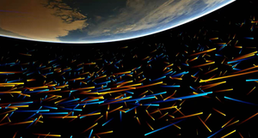Next Generation Space Debris Environment Model
- Started
- 19th September 2016
- Research Team
- Samuel Diserens
- Investigators
- Hugh Lewis
Space debris has been recognised by the international space-faring community as a significant threat to spacecraft operations in Earth orbit. In 1993 the Inter-Agency Space Debris Coordination Committee (IADC) was founded with a key aim to identify space debris mitigation options. To achieve this aim several computer models were created and used by space agencies to investigate potential mitigation measures including a key strategy of post-mission disposal. The University of Southampton's debris model, called 'DAMAGE', has been used to support these activities since 2004 and, thanks to ongoing development, remains at the forefront of space debris modelling capability worldwide.
However, there is a growing consensus amongst the University team that the model is not well-suited for tackling the emerging challenges associated with space sustainability. These challenges include inter-disciplinary issues related to space debris, space operations, space situational awareness, space weather, commercialisation, possible conflicts in space and regulation.
To address these issues and to provide vital inputs to ongoing and future discussions of debris mitigation and remediation options (e.g. within the IADC), a next-generation model is needed. This model will likely need to incorporate simulation (e.g. involving software agents), heuristics and learning, to capture the behaviour of space users, regulators, etc., as well as making use of novel techniques for propagating the orbits of objects and predicting collisions between them. In addition, high-performance computing solutions and emulation approaches, which make use of empirical models, may be required to allow the generation of ensembles that capture the full range of uncertainty in many elements.
The project will therefore aim to develop the necessary computational methods (encompassing the full scope or focusing on the essential components) and apply these to address intractable problems that cannot be resolved using the existing approaches. As such, the project will make an important contribution to the ongoing work of the IADC and enable future space systems to be sustainable.
Categories
Transdisciplinary tags: HPC, NGCM, Scientific Computing
